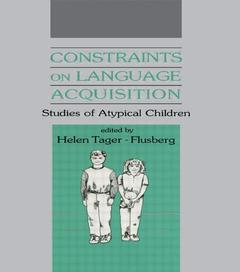Constraints on Language Acquisition Studies of Atypical Children
Coordonnateur : Tager-Flusberg Helen

After decades of research most scholars generally agree that language acquisition is a complex and multifaceted process that involves the interaction of innate biologically-based mechanisms devoted to language, other non-linguistic cognitive and social mechanisms, linguistic input, and information about the social and physical world. Theoretical work in the field of language acquisition now needs to focus in greater depth and detail on some specific aspects of this general model, which is the main goal of this book. The chapters in this volume provide some new insights into one of the most remarkable accomplishments achieved by almost all children.
The particular questions that are raised by contributors include:
* What kinds of constraints operate on the process of language development?
* Which aspects of the acquisition process depend on language-specific mechanisms?
* Are there critical brain structures necessary for the acquisition of language?
* What role do cognitive and social mechanisms play in language development?
* How critical is perceptual input about the physical and social world?
* What is the specific role played by linguistic input in the child's construction of a linguistic system?
Questions are addressed from the perspective of children who come to the task of acquiring language with many hurdles to overcome, including deafness and blindness, mental retardation, autism, and prenatal or perinatal brain damage involving the left hemisphere.
Each section contributes some insight on how an innate language-specific biological substrate interacts with cognitive and social factors, as well as external information, to support the child's construction of a linguistic system. Studies of atypical children offer a singular contribution to this enterprise by allowing us to see the specific influences of each component, and in turn, they shed new light on how all children are able to acquire language so effortlessly and during such a brief period of development.
Contents: H. Tager-Flusberg, Contributions to the Field of Language Acquisition from Research on Atypical Children. J. de Villiers, P. de Villiers, E. Hoban, The Central Problem of Functional Categories in the English Syntax of Oral Deaf Children. Y. Levy, N. Amir, R. Shalev, Morphology in a Child with a Congenital Left-Hemisphere Brain Lesion: Implications for Normal Acquisition. H.M. Feldman, Language Development After Early Unilateral Brain Injury: A Replication Study. A.E. Fowler, R. Gelman, L.R. Gleitman, The Course of Language Learning in Children with Down Syndrome: Longitudinal and Language Level Comparisons with Young Normally Developing Children. R. Cromer, A Case Study of Dissociations Between Language and Cognition. J.A. Rondal, Exceptional Cases of Language Development in Mental Retardation: The Relative Autonomy of Language as a Cognitive System. H. Tager-Flusberg, Dissociations in Form and Function in the Acquisition of Language by Autistic Children. A.M. Peters, The Interdependence of Social, Cognitive, and Linguistic Development: Evidence from a Visually Impaired Child.
Date de parution : 12-1993
15.2x22.9 cm
Date de parution : 04-2015
15.2x22.9 cm
Thèmes de Constraints on Language Acquisition :
Mots-clés :
relative; clauses; development; oral; deaf; children; left; hemisphere; damage; autistic; High Level Language Abilities; Average MLU; Low MLUs; Child Language Data Exchange System; Spina Bifida Children; Oral Deaf Children; Nonverbal IQ Score; De Villiers; Normal Hearing Children; Spina Bifida; RH Injury; Deaf Children; LH Injury; Small Clause; Double Object Constructions; Autistic Children; Cocktail Party Syndrome; Deaf Students; Mental Development; LH Damage; RH Damage; Deaf Subjects; Closed Class Vocabulary; Fitted Growth Curves; Hebrew Morphology



